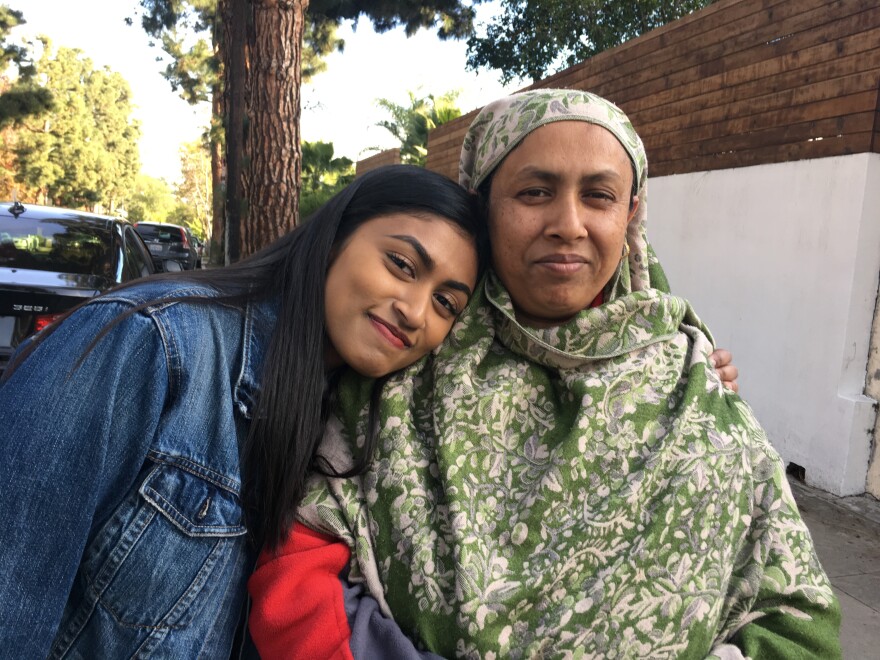This archival content was originally written for and published on KPCC.org. Keep in mind that links and images may no longer work — and references may be outdated.
Kids miss college because their parents won’t apply for financial aid
This story has been updated.
At Downtown Magnets High School in Los Angeles, college counselor Lynda McGee talked about a "heartbreaking" case.
A senior at the school, a U.S. citizen with grades strong enough to get into college, couldn't get her parents to fill out the Free Application for Federal Student Aid, or FAFSA, before the March 2 deadline, said McGee. The FAFSA is the gateway to nearly all financial aid.
"Her parents ... are from the Philippines and they are … in process to get their green cards now," she said." And they’re afraid that if she applies for financial aid it will somehow cause a problem with their application and I tried to convince them that that was not true."
A significant minority of high school seniors who wouldn't be able to afford college without financial help can't get their parents to sign the FAFSA. Justin Draeger, president of the National Association of Student Financial Aid Administrators, estimates about 5 percent of seniors who want to go to college fall into this category.
The FAFSA requires students and their parents to reveal their immigration status, the state of their finances and any public benefits they may have used.
The U.S. Department of Education collects the information but doesn’t share it with immigration authorities. A lot of people don’t known that, and their fears are heightened by the Trump administration’s tough anti-immigrant policies.
"I had a parent in here crying … she was scared that if she put this information out there, she would be putting herself and her son at risk for deportation," said Tricia Bryan, college counselor at L.A.'s Marshall High School.
"I feel like that struggle that students have with their parents usually falls into two categories: fear or anger," she said.
Of the roughly two dozen Marshall seniors who didn’t submit the FAFSA this year because their parents refused to sign, Bryan said worries about immigration weren’t the only reason. In some cases, she said, a student is estranged from one or both parents.
A student turns a parent around
Marshall senior Sheila Milon faced a similar situation.
"There’s always been domestic violence in my house, and like financial problems with my parents," she said. Her dad moved out two years ago and her parents are getting a divorce. Milon said she’s had very little contact with her father since he left.
"My dad is so difficult with getting ... financial aid documents. It was very difficult to get his taxes," she said, adding that she called her dad repeatedly in hopes of getting him to send her his W-2 forms. "He didn’t give it to me, he didn’t even answer my calls," said Milon.

She had filled out her FAFSA with her father's information earlier in the school year. The FAFSA does allow students to omit the information of one parent in case of a divorce or separation.
Milon needed the W2 for the College Scholarship Service PROFILE, a form used mostly by private colleges and universities to award aid.
Bryan told her that exceptions are made only for kids who have no way of contacting their non-custodial parent.
Milon didn’t give up. She got a letter from her dad’s tax preparer saying he couldn’t give her the forms. But colleges she was interested in said that wasn’t enough.
And then, just a few days before the March 2 deadline, a break. In desperation, Milon had called her dad again to tell him she’d been accepted to UC Berkeley.
"He picked up, and he was like, 'Wow, congrats, I’m so proud of you,' words I’ve never heard my dad say before," she said.
This was her chance. Milon told him she couldn’t go to Berkeley if he didn’t give her a copy of his W-2. She knew she could. To her relief, he gave her the document. She finally had everything she needed for public and private colleges' aid applications.
A national problem
Milon said the rules governing financial aid documents shouldn’t be so strict, and exemptions should be made for students in her situation. Counselors and national financial aid experts don’t see things changing anytime soon. The current process may be imperfect, they said, but it achieves the goal of measuring a parent's ability to pay for a child's higher education.
"The idea is that we’re trying to divvy up a limited source of funding in a fair and equitable way," said Draeger of the financial aid administrators association. "The way that we do that is we try to take into account income and resources of all of the applicants."
For now, the best thing a high school senior can do to turn around parents reluctant to fill out the FAFSA is to enlist a college counselor to help explain the process, and to begin those conversations well before senior year.


